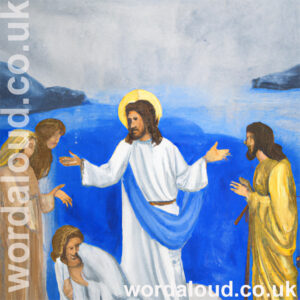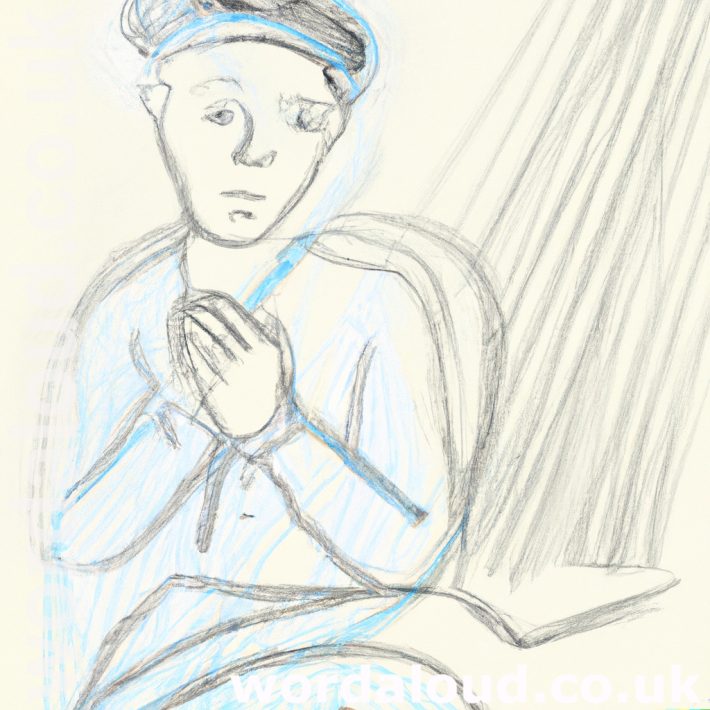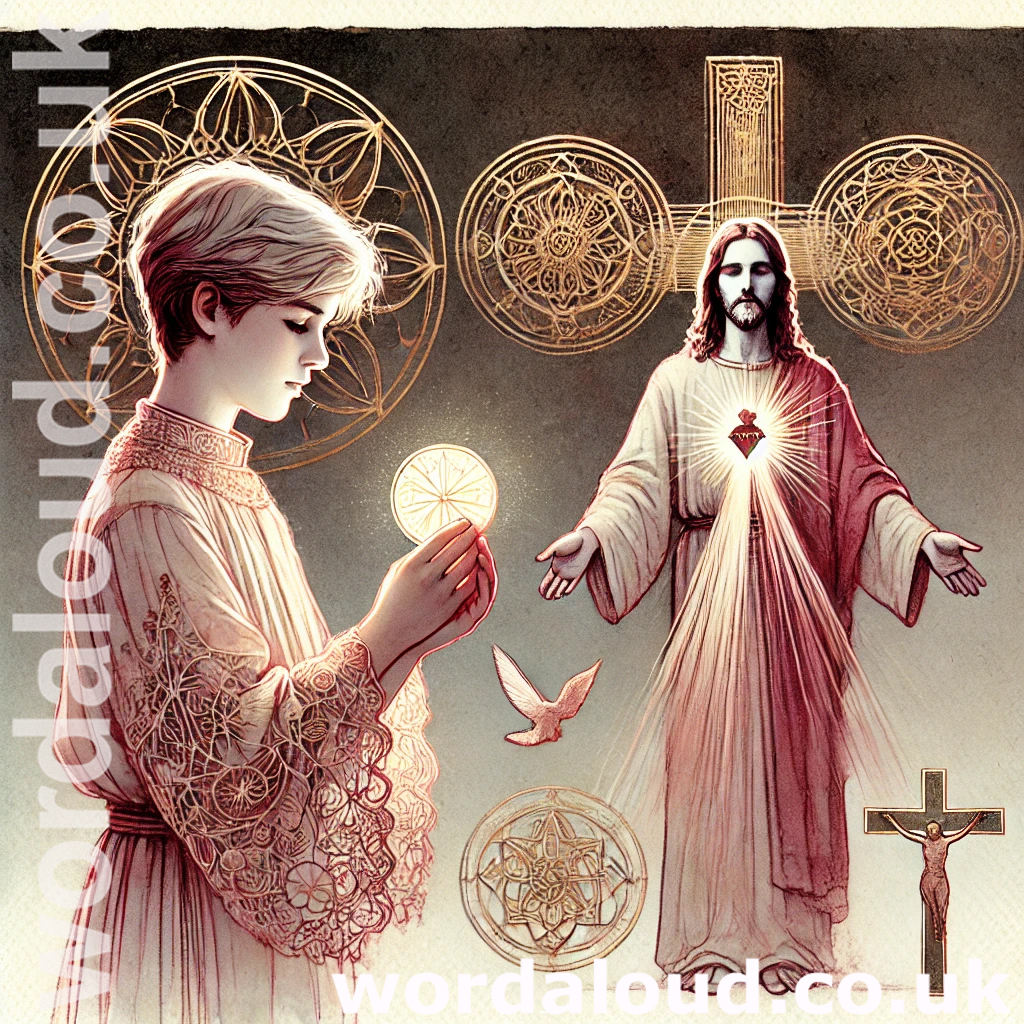Christian Art | Child At Prayer
Office Of Readings | Thursday, Lent Week 4 | From The Sermons Of Pope Saint Leo The Great
‘Contemplation of the Lord’s Passion.’
Meditating On The Passion | Path To Resurrection
Pope Saint Leo the Great’s reflection on the Passion of Christ invites us to fix our gaze on the crucified Jesus, not only as an act of devotion but as an essential means of recognizing our own humanity in Jesus. Pope Saint Leo emphasizes that the suffering and death of Christ are not distant historical events but realities that intimately concern every believer. True reverence for the Passion, he insists, requires an interior transformation, where we experience in our hearts the effects of Christ’s death and resurrection.
This theme of personal participation in the Passion echoes throughout early Christian thought. Saint Paul, in Romans 6:8, reminds us: ‘If we have died with Christ, we believe that we will also live with him.’ Pope Leo builds upon this scriptural foundation, teaching that our spiritual journey should mirror the mystery of the Passion—death to sin, renewal in Christ, and the hope of resurrection.
Trembling Of The Earth And Hardness Of Hearts
Leo interprets the physical signs at the moment of Christ’s death—earthquakes, the splitting of rocks, and the resurrection of the dead (Matthew 27:51-53)—as symbols of the spiritual transformation that should take place within us. The earth, representing human nature, trembles in recognition of its Redeemer. The hardened hearts of unbelievers, like the shattered rocks, must break open to receive grace. The resurrection of the dead prefigures both our bodily resurrection and the renewal of our souls in Christ.
This imagery draws upon Old Testament prophecy. Ezekiel 36:26 declares, ‘I will give you a new heart and put a new spirit in you; I will remove from you your heart of stone and give you a heart of flesh.’ Leo calls us to examine whether we, too, have hardened hearts that resist grace. Are we moved by the Passion, or do we remain indifferent?
No One Is Beyond Redemption
A central theme in Leo’s teaching is the universality of Christ’s redemptive sacrifice. The victory of the cross extends to all, even those who initially reject Christ. He recalls how Jesus, from the cross, prayed for his executioners: ‘Father, forgive them, for they know not what they do’ (Luke 23:34). If Christ’s intercession brought hope to those who crucified him, how much more will Jesus’ prayer avail those who repent and turn to him?
Leo warns against despair, urging us to trust in divine mercy. The Passion overcomes ignorance, breaks the bonds of sin, and reopens the gates of paradise. The cherubim who once guarded the way to the tree of life in Genesis 3:24 no longer bar our entrance; Jesus Christ, by his blood, has quenched the sword that once kept us out. This is a call to hope: no sin is too great for God’s mercy, and no soul is beyond the reach of Christ’s redeeming love.
Following The Redeemer’s Example
The reading challenges us not to be consumed by worldly anxieties and pride. Pope Leo warns that preoccupation with earthly matters can dull our spiritual senses, making us indifferent to Christ’s example. Instead, we are called to embrace Jesus’ way of life—marked by humility, obedience, and love.
Leo makes a crucial connection between Christ’s assumption of human nature and our own participation in divine life. He states: ‘He wanted His body to share the goodness of its head.’ This means that because Christ became one with us in our humanity, we can now share in his divinity. This is the profound mystery of salvation: Christ assumed our nature to heal it and elevate it.
The Incarnation was not merely an event in history but a continual reality for believers. Leo asks: ‘Who does not share a common nature with Christ if he has welcomed Christ, who took our nature, and is reborn in the Spirit?’ By receiving the Spirit in baptism, we are united with Christ in a real and transformative way.
Resurrection Of The Body And Promise Of Glory
Pope Leo concludes by affirming that Christ’s resurrection is the guarantee of our own. He makes a striking assertion: ‘The body that lay lifeless in the tomb is ours. The body that rose again on the third day is ours. The body that ascended above all the heights of heaven to the right hand of the Father’s glory is ours.’ In these words, he underscores the radical truth of Christian hope: we are not only spiritually saved, but our very bodies will one day share in Christ’s glorification.
The condition for this future glory, however, is faithfulness to Christ. ‘Whoever acknowledges me before men, I too will acknowledge him before my Father in heaven’ (Matthew 10:32). This acknowledgment is not merely verbal but must be expressed in a life that bears witness to Christ’s Passion and resurrection.

From The Sermons Of Pope Saint Leo The Great
True reverence for the Lord’s passion means fixing the eyes of our heart on Jesus crucified and recognising in him our own humanity.
The earth – our earthly nature – should tremble at the suffering of its Redeemer. The rocks – the hearts of unbelievers – should burst asunder. The dead, imprisoned in the tombs of their mortality, should come forth, the massive stones now ripped apart. Foreshadowings of the future resurrection should appear in the holy city, the Church of God: what is to happen to our bodies should now take place in our hearts.
No one, however weak, is denied a share in the victory of the cross. No one is beyond the help of the prayer of Christ. His prayer brought benefit to the multitude that raged against him. How much more does it bring to those who turn to him in repentance.
Ignorance has been destroyed, obstinacy has been overcome. The sacred blood of Christ has quenched the flaming sword that barred access to the tree of life. The age-old night of sin has given place to the true light.
The Christian people are invited to share the riches of paradise. All who have been reborn have the way open before them to return to their native land, from which they had been exiled. Unless indeed they close off for themselves the path that could be opened before the faith of a thief.
The business of this life should not preoccupy us with its anxiety and pride, so that we no longer strive with all the love of our heart to be like our Redeemer, and to follow his example. Everything that he did or suffered was for our salvation: he wanted his body to share the goodness of its head.
First of all, in taking our human nature while remaining God, so that the Word became man, he left no member of the human race, the unbeliever excepted, without a share in his mercy. Who does not share a common nature with Christ if he has welcomed Christ, who took our nature, and is reborn in the Spirit through whom Christ was conceived?
Again, who cannot recognise in Christ his own infirmities? Who would not recognise that Christ’s eating and sleeping, his sadness and his shedding of tears of love are marks of the nature of a slave?
It was this nature of a slave that had to be healed of its ancient wounds and cleansed of the defilement of sin. For that reason the only-begotten Son of God became also the son of man. He was to have both the reality of a human nature and the fullness of the godhead.
The body that lay lifeless in the tomb is ours. The body that rose again on the third day is ours. The body that ascended above all the heights of heaven to the right hand of the Father’s glory is ours. If then we walk in the way of his commandments, and are not ashamed to acknowledge the price he paid for our salvation in a lowly body, we too are to rise to share his glory. The promise he made will be fulfilled in the sight of all: Whoever acknowledges me before men, I too will acknowledge him before my Father who is in heaven.








